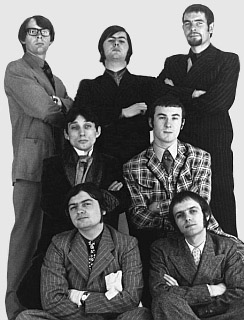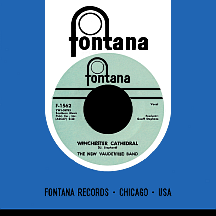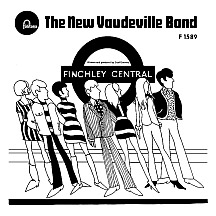THE NEW VAUDEVILLE BAND
Winchester Cathedral
There was this retro mini-revival, a peculiar, nostalgic trend in the late 1960s of performing in a style reminiscent of some 40 to 50 years past, when ragtime was at its peak and pop singers enhanced their vocals with megaphones, those cone-shaped, hornlike thingies thought to enhance the human voice better than the entry-level microphones of the era. By the '60s, technological advancements (hi-fi, for one) had changed the way music sounded...on studio-produced records, at least. Geoff Stephens, a musician and songwriter from Essex, age 31 in 1966, already had two U.K. hits to his credit ("Tell Me When" by The Applejacks, co-written with Les Reed, and "The Crying Game" by Dave Berry, both in '64). He'd also become a fan of the bygone genre of British music hall entertainment and its loosely related American counterpart, vaudeville. He composed and produced "Winchester Cathedral" less as an ode to the music of the 1910s or 1920s than as a novelty song, a gimmick that might catch on.
The shrine of the song's title and lyrics, one of Britain's largest cathedrals, served strictly as a backdrop: '...you're bringin' me down...you stood and you watched as...my baby left town.' The appeal was in the antiquated dance band sound of the session's musicians and the voice of John Carter, previous lead singer for The Ivy League (a U.K. trio with a pair of top ten hits, "Funny How Love Can Be" and "Tossing and Turning"). His vocal, which kicks in after the 56-second instrumental intro on this 143-second song, sounds as if megaphone king Rudy Vallée had done it himself. 'A-vo-de-o-doe, a-vo-de-o-doe...' and the Fontana label track was headed for the U.K. top ten under a not-so-imaginative name, The New Vaudeville Band. Even Stephens was amazed when, just five weeks after its late-October '66 release in the States, it reached number one!
Despite its being strictly a studio creation, offers for live appearances started pouring in, so Geoff set to work assembling a group of appropriate, musically talented and tongue-in-cheek-type chaps for an undertaking that might last a few months...or, with luck, a few years. Sax and trombone player Robert "Pops" Kerr (of the The Bonzo Dog Doo-Dah Band, a musical parody group drawing from music hall elements) signed on and was joined by another trombonist, Hugh "Shuggy" Watts, keyboardist Stanley K. Wood, bassist Neil Korner (replaced soon afterwards by bass and tuba man Chris Eedy), drummer "Mad" Henri Harrison, be-bop guitarist "Moody" Mick Wilsher and new lead singer Alan Klein, who opted to hide his true name in favor of an alter-ego: Tristram VII (sometimes misspelled Tristam), the roman numeral standing for "Seventh Earl of Cricklewood" (fake name, real place). Leader Stephens didn't tour with the septet but continued writing, producing and masterminding the entire project. Carter, despite his important contribution, bowed out but continued working with Stephens on other projects. The intimidating-but-results-obtaining Peter Grant (former manager for The Nashville Teens and later for The Yardbirds and Led Zeppelin) was hired as the designated strong-arm-tactics specialist.
"Winchester Cathedral" became a sensation in the latter three months of 1966; by the end of November the single was certified by the RIAA for sales of over one million copies. A like-titled longplay had been put together and sent to stores while Lawrence Welk, that keen week-to-week emulator of massive pop music trends, had already banged out a cover version and album, also titled Winchester Cathedral; somehow it debuted on Billboard's LP chart at the beginning of December, a week ahead of the NVB disc (one of the set's original songs, the Stephens-Reed tune "Kind of Hush," was covered by Herman's Hermits, with an expanded title, and reached the top ten a few months later). Welk's album sold well, but ultimately the New Vaudeville Band's debut dominated (both were certified gold). Meanwhile, well-seasoned ex-vaudevillian Vallée, who'd just joined the ranks of senior citizenship, couldn't resist the urge to record a version of the song bearing his brand; the album Hi Ho Everybody appeared almost immediately with his cover of "Winchester Cathedral" as the lead track.

Dozens of cover versions were released in the coming months, most of them imitating the original's arrangement - a practice that would later be compared to karaoke, which should be a no-no for any self-respecting professional artist! A group called New Happiness (led by the ultra-obscure "Smooth" Lundvill) slapped together a cover that appeared on sales surveys the same week as the NVB disc (word got around fast!) while a much more interesting version came from high school student Dana Rollin, whose period-style "flapper girl" recording on the Tower label, the only other version to reach the Hot 100, charted for several weeks.
The New Vaudeville Band hadn't just scored a hit...they had started a trend. Suddenly other artists were jumping on the bandwagon, doing their own interpretations of early-century sounds, in musical approach though not always covering subject matter from that time. Ian Whitcomb, who'd always had a fascination with ragtime-era music, was briefly successful near the end of '66 with "Where Did Robinson Crusoe Go With Friday on Saturday Night?," which had been a big seller in 1916 for Al Jolson. Peter and Gordon had a top ten hit in November with the risque tale of 900-year-old "Lady Godiva," placing the long-haired equestrian in the modern movie age. Two groups in early '67, The Sopwith "Camel" ("Hello, Hello") and The Rainy Daze ("That Acapulco Gold") enjoyed sales and airplay success with oldfangled arrangements and megaphone-reminiscent vocals. At about the same time, Harpers Bizarre had a retro-styled hit with "The 59th Street Bridge Song (Feelin' Groovy)," then employed the gimmick on four more charting follow-ups.
Next came Thoroughly Modern Millie starring Julie Andrews; set in 1922, it was one of the year's top movies, an original musical comedy that conveniently bypassed the Broadway stage. The film featured plenty of new-but-old-sounding songs (and won an Oscar for Elmer Bernstein, who composed its score) and the soundtrack album sold well during an eleven-month run on the charts starting in April, just after the movie's debut amidst all those vaudeville-esque radio hits...coincidence? The NVB couldn't resist covering the film's title theme. Even The Beatles joined the fun, or more specifically Paul McCartney with his old-time Sgt Pepper track "When I'm 64" and flapper-era "White Album" song "Honey Pie." Israeli duo Esther and Abi Ofarim toyed with the earlier style on their spring '68 international hit "Cinderella Rockefella" and Herbert Khaury, famously known as Tiny Tim, made the top 20 in June 1968 with his remake of Nick Lucas's 1929 chart-topper "Tip-Toe Thru the Tulips With Me."
The New Vaudeville Band kept the momentum going with "Peek-A-Boo," another true-to-the-'20s production (giving label credit to replacement singer Tristam/Tristram VII) that became the act's second top ten U.K. hit in February '67 while spending a few weeks on the U.S. charts. In March, "Winchester Cathedral" was nominated for two Grammys: the big one, Record of the Year, and Best Contemporary Rock and Roll Recording, winning the latter award over five nominees a little more closely aligned to the rock genre. "Finchley Central," using a train station in England as its setting for heartbreak (the U.K. picture sleeve shows a map of the train routes), and "Green Street Green" (with the word 'onomatopoeic' in the lyrics...how often does that happen?) both reached the British top 40 in 1967. "The Bonnie and Clyde" (a "scything motion" dance touted as a "rousing opportunity to get the ladies!") gyrated into the U.S. charts in 1968 while time-stamping the original band's bloody ending.
The fad had run its course inside two years, but a newer New Vaudeville Band appeared in the '70s, mainly as a touring group with an updated style. "Dear Rita Hayworth" in '73, "At Last" in '74 and a last-gasp cover of ABBA's "Thank You For the Music" in '78 comprise their scant catalog of later releases. As for Geoff Stephens, he and John Carter penned "My World Fell Down" for a post-Carter lineup of the Ivy League; the song fared better via a version by Gary Usher's studio group Sagittarius. Stephens continued working behind the scenes and wrote many hit songs over many years.



